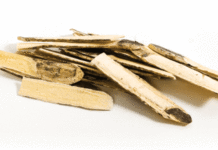
You’ve probably spotted collagen as an ingredient in a skin cream. Chances are, you’ve seen it called for in a smoothie recipe. Maybe you’ve even been offered a liquid dollop of it in your coffee.
Have you ever paused to wonder why this protein has become ubiquitous?
Collagen 101
First, know this: Collagen is the most abundant structural protein in your body, and your body is built to create it. We all break dietary protein down into amino acids, some of which are then repurposed into collagen.
Collagen is vital for our bones, muscles, tendons, and ligaments, and it acts like glue for joints. It’s our skin’s strongest ally, working in tandem with elastin to create resilience and elasticity.
“It’s a necessary building block for everyone,” says Dr. Rina Allawh, a board-certified dermatologist. “But starting in our mid- to late 20s, we start to lose one percent of our collagen every year.”
So what do we do? Take matters into our own hands.
Peptides to the rescue
Since collagen is a protein, getting our fill should be as easy as adding more protein-rich foods to our diet, right?
Not so fast, says Allawh: “Collagen isn’t a simple protein.”
That means, scientifically speaking, that collagen is composed of three cross-linked polypeptide chains made primarily of glycine, proline, and hydroxyproline; all are amino acids, and one (hydroxyproline) isn’t found in any other proteins.
It’s difficult for your body to break these chains down so the collagen can be absorbed in a useful way. So while eating collagen-rich foods like chicken, fish, and eggs is certainly beneficial, it may not be enough to counteract our natural loss of collagen, according to Allawh.
Enter collagen peptides, aka hydrolyzed collagen. “Hydrolyzed” means the collagen’s amino acid chains have been broken down into smaller parts. These small peptides are more easily digested.
Collagen peptides are commonly found as capsules, liquid formulas, and powders that you can mix into drinks or stir into food.
Goodbye, aging signs
You can also find collagen peptides in popular skin creams for topical application. “Most people are willing to invest in the antiaging effects,” says Allawh.
As we age, and especially in our 40s, the depletion of collagen acting as scaffolding in our skin leads to visible signs like sagging or crepe-like skin around the face, arms, and neck.
“The aging process changes your skin naturally,” says Allawh. “But when you factor in other things like sun exposure and air pollution, you’ve got accelerated collagen loss to a point where your body can’t replace it.”
Typically, after six months of using a collagen-based skin cream, you’ll likely see results, notes Allawh. Doubling down by using creams that contain both collagen and retinol, another age-fighter and a derivative of vitamin A, can help as well. However, using retinol products during the day isn’t recommended, as retinol can make skin overly sensitive to the sun. If you want to give a retinol-containing cream a try, be sure to apply it at night before going to bed.
“People see collagen [topicals and supplements] as a non-invasive alternative to Botox or fillers. It’s truly where skincare is going right now,” says Allawh.
Beyond skin benefits
Your bones crave collagen too: Studies show collagen supplements may improve bone mineral density.
Collagen is also a main component of cartilage, the rubbery tissue that protects your joints. So it’s no surprise that researchers have seen joint pain improve with collagen supplements, particularly in cases of osteoarthritis.
When you consider collagen’s potential to support our joints, bones, skin, it’s clear why this multitasking protein is moving from everyone’s radar into heavy rotation.
Other skin and joint superstars
Cocoa flavanols are antioxidants that support circulation, brain, heart, and skin health. Sold as supplements, you can also find cocoa flavanols in certain chocolate bars.
Genistein is an estrogen-like substance found in some plants, particularly soybeans. It’s believed to help maintain bone mineral density. It may also slow down the loss of collagen and moisture from the skin that comes with age. Look for it on health food store shelves as a supplement.
Hyaluronic acid is a hydration hero, keeping connective tissue lubricated and giving your skin a smooth, firm look. It’s a common ingredient in facial moisturizers and can be taken as a supplement for skin and joint benefits.
Collagen powder 5 ways
Here are some creative game plans for those healthy little particles. Just be sure to follow the dosage directions on your product.
- Mix into baked goods.
- Stir into soup.
- Add to your latte.
- Sprinkle over fresh fruit.
- Bake into a casserole.




































